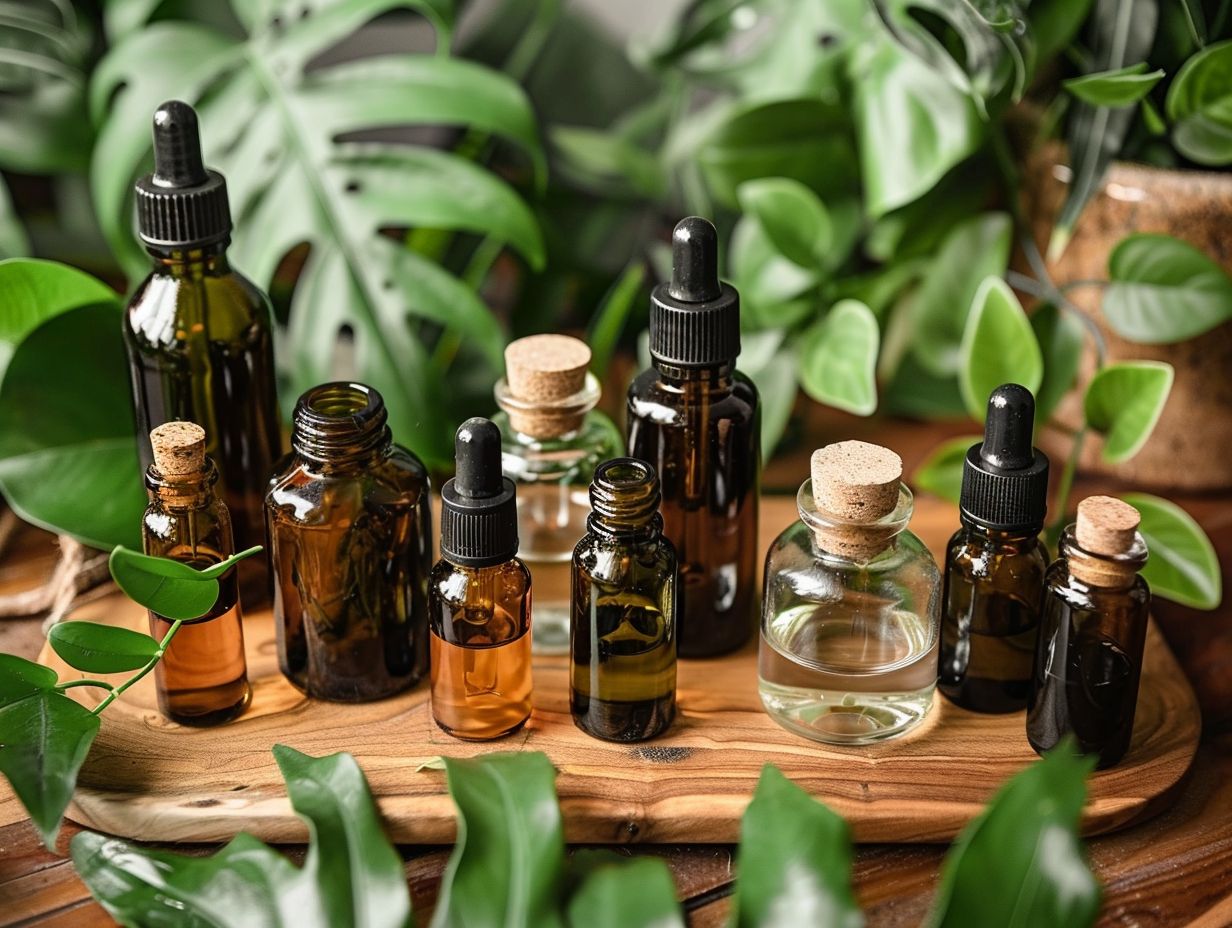What Essential Oils for Eczema
Eczema is a common skin condition that affects millions of people worldwide. From its causes and symptoms to the various types of eczema, understanding this condition is crucial for effective management.
One popular natural remedy for eczema is the use of essential oils. We will explore the best essential oils for eczema, how to use them effectively, and most importantly, whether they are safe for use.
Discover the world of essential oils and their potential benefits for eczema sufferers.
Key Takeaways:
What Is Eczema?
Eczema, also known as atopic dermatitis, is a common skin condition characterized by inflammation, redness, and irritation. It falls under the category of dermatological conditions that affect the skin’s health and appearance.
Eczema is a prevalent issue, affecting individuals of all ages worldwide. Its impact on skin health can vary from mild discomfort to severe distress, depending on the intensity of symptoms. The exact cause of eczema is not entirely understood, but it is believed to be linked to genetic and environmental factors. This chronic condition often manifests as dry, itchy patches on the skin, leading to scratching that can exacerbate the inflammation.
What Causes Eczema?
The causes of eczema are multifaceted and can vary from person to person. Factors such as skin inflammation, exposure to irritants, and genetic predispositions can contribute to the development and exacerbation of eczema symptoms.
Eczema, also known as atopic dermatitis, is a chronic skin condition that affects millions of individuals worldwide. While the exact cause of eczema is not fully understood, research suggests that a combination of environmental triggers and genetic factors plays a significant role in its development. Individuals with a family history of allergies or asthma are more prone to developing eczema, indicating a strong genetic link. Environmental factors such as weather changes, humidity levels, and exposure to certain allergens can trigger eczema flare-ups.
Is Eczema Hereditary?
Yes, eczema can have a hereditary component, with certain genetic factors increasing the likelihood of developing atopic dermatitis within families.
Genetic research has shown that individuals with a family history of eczema are more predisposed to the condition. The transmission of atopic dermatitis can follow patterns of inheritance, where specific genes associated with skin inflammation play a crucial role. These genetic predispositions can lead to an increased susceptibility to environmental triggers that exacerbate eczema symptoms. Understanding the genetic link in eczema not only sheds light on the complexity of skin conditions but also highlights the importance of personalized treatment approaches based on individual genetic profiles.
What Are the Symptoms of Eczema?
Eczema manifests through a range of symptoms that affect the skin’s appearance and texture. Common signs include redness, dryness, itching, and irritation, which can vary in intensity and location.
Redness in eczema usually appears as patches that are inflamed and discolored, often taking on a pink or red hue. Dryness is a prevalent symptom, leading to flaky, rough, and scaly skin. Itching, another hallmark of eczema, can be intense, persistent, and disruptive, causing discomfort and distress. In severe cases, the skin may crack, ooze, or bleed, exacerbating the condition. Other manifestations include swelling, weeping, and crusting of the affected areas, making eczema visually distinct and easily identifiable.
Does Eczema Cause Itching?
Itching is a common symptom of eczema, often associated with the inflammatory response that the skin undergoes during eczema flare-ups.
When someone experiences eczema, the itchiness can be relentless, causing discomfort and frustration. This persistent urge to scratch is a result of various factors such as dry skin, allergens, irritants, and genetic predisposition.
Scratching can further exacerbate the condition, leading to a vicious cycle of irritation, inflammation, and potential infection. It is essential for individuals with eczema to resist the temptation to scratch, as it can damage the skin barrier, making it more susceptible to flare-ups.
Effective management strategies for itching in eczema include moisturizing regularly, avoiding triggers such as harsh soaps and detergents, using mild skincare products, and incorporating anti-inflammatory treatments like topical corticosteroids or calcineurin inhibitors.
Can Eczema Cause Redness and Inflammation?
Yes, eczema can lead to redness and inflammation in affected areas of the skin due to the body’s immune response and the skin’s hypersensitivity to triggers.
When eczema flares up, the immune system overreacts, triggering inflammation as a defense mechanism against perceived threats. This heightened immune response causes blood vessels near the skin’s surface to dilate, leading to the characteristic redness associated with eczema. The inflammatory processes also contribute to the skin becoming itchy, dry, and sometimes blistered.
The release of inflammatory mediators, such as histamines and cytokines, worsens the skin reactions, further exacerbating the symptoms of eczema. It’s crucial to manage these inflammatory responses effectively to alleviate discomfort and prevent flare-ups.
Does Eczema Cause Dry Skin?
Eczema often results in dry skin, as the condition impairs the skin’s ability to retain moisture, leading to flakiness, roughness, and discomfort.
When eczema affects the skin, it disrupts the natural balance of moisture, causing a shortage of essential oils and hydration that normally keep the skin supple and healthy. This disruption compromises the skin’s protective barrier, altering its ability to trap moisture within its layers. As a result, the skin becomes prone to dryness, which manifests as itching, redness, and scaling. Proper management of eczema involves restoring the skin’s moisture balance through the use of emollients and moisturizers. By replenishing lost moisture, these products help alleviate the symptoms of dry skin associated with eczema.
What Are the Types of Eczema?

Atopic dermatitis is one of the most prevalent forms of eczema, primarily affecting those with a family history of allergies. It often manifests as red, itchy patches on the skin, typically in flexural areas.
Contact dermatitis, on the other hand, is a result of skin contact with irritants or allergens, leading to redness, itching, and sometimes blistering.
Nummular eczema is characterized by coin-shaped lesions, usually on the arms and legs. Seborrheic dermatitis primarily impacts the scalp, causing flaky, yellowish scales.
Each type requires specific management strategies tailored to its unique symptoms and triggers.
Atopic Dermatitis
Atopic dermatitis, a prevalent form of eczema, presents with symptoms such as redness, inflammation, itching, and recurrent flare-ups due to immune system dysregulation.
These symptoms are a result of the inflammatory response triggered by the immune system in response to various triggers, which can include allergens, irritants, stress, and environmental factors. Itching is a common and distressing feature, leading to the characteristic scratching that can exacerbate the condition.
People with atopic dermatitis often experience periods of remission followed by flare-ups, which can be unpredictable and significantly impact their quality of life. The condition can vary in severity, with some individuals experiencing mild symptoms and others facing more severe, persistent issues that require intensive management.
Contact Dermatitis
Contact dermatitis, another form of eczema, occurs when the skin comes into contact with irritants or allergens, leading to localized redness, itching, and skin reactions.
This condition can be triggered by a wide range of substances, from metals like nickel to chemicals found in household products. Common symptoms of contact dermatitis include dry, cracked skin, blisters, and even oozing lesions in severe cases. Identifying the specific trigger is crucial in managing this condition effectively. Treatment often involves avoiding the irritant or allergen, using topical corticosteroids to reduce inflammation, and practicing proper skincare routines to promote healing and prevent flare-ups.
Nummular Eczema
Nummular eczema is characterized by circular or coin-shaped lesions on the skin, often accompanied by dryness, itching, and a tendency to recur in certain patterns.
These circular patches can vary in size and are typically red, scaly, and can ooze fluids.
This type of eczema commonly appears on the arms, legs, and torso, but can also affect other parts of the body.
Individuals with nummular eczema may experience periods of worsening symptoms followed by periods of improvement.
Proper skincare, moisturizing, and identifying triggers can help manage this condition effectively.
Seborrheic Dermatitis
Seborrheic dermatitis primarily affects areas rich in oil glands, such as the scalp, leading to symptoms like oily, flaky skin, redness, and persistent irritation.
Individuals with this condition may also experience stinging or itching on the affected areas. One distinguishing feature of seborrheic dermatitis is the formation of yellowish or white, greasy scales on the skin or scalp. It is essential to note that seborrheic dermatitis is a chronic condition that can have periods of flare-ups and remissions. Factors like stress, hormones, and certain medical conditions can influence the severity of symptoms.
What Essential Oils Can Help with Eczema?
Several essential oils have shown promise in providing relief for eczema symptoms. Common options include lavender oil, tea tree oil, and chamomile oil, known for their soothing and anti-inflammatory properties.
Each of these essential oils offers unique benefits for managing eczema.
- Lavender oil is celebrated for its calming effects on the skin and mind, helping reduce itching and inflammation. It can be applied topically or added to a warm bath for a relaxing experience.
- Tea tree oil is renowned for its antimicrobial and anti-inflammatory properties, making it a popular choice for treating eczema flare-ups. Diluting it with a carrier oil before applying it to the affected areas can help alleviate symptoms.
- Chamomile oil is gentle and soothing, perfect for sensitive skin. Its anti-inflammatory and antioxidant properties can help reduce redness and irritation associated with eczema. Mixing a few drops with a carrier oil and gently massaging it onto the affected skin can provide relief.
Tea Tree Oil
Tea tree oil is a popular choice for eczema due to its antimicrobial properties that can help in reducing inflammation and providing a natural treatment option for skin irritations.
The anti-inflammatory nature of tea tree oil can help alleviate the itching and discomfort associated with eczema flare-ups. Its ability to soothe the skin and promote healing makes it a valuable addition to skincare routines for those dealing with eczema.
Along with its topical benefits, the therapeutic uses of tea tree oil extend to its calming aroma, which can also have a positive impact on mental well-being. Incorporating tea tree oil into a holistic approach to managing eczema can provide both physical relief and a sense of relaxation.
Lavender Oil
Lavender oil is known for its calming and relaxing properties, making it a beneficial option for managing eczema symptoms exacerbated by stress and anxiety.
In terms of eczema care, incorporating lavender oil can provide a dual benefit by addressing both the physical symptoms and the psychological stressors associated with the condition. The soothing aroma of lavender oil not only helps in reducing feelings of tension, but it also aids in promoting better sleep quality, which is crucial for overall skin health. The anti-inflammatory and antimicrobial properties of lavender oil can help in alleviating itchiness, redness, and irritation on the skin, making it a versatile natural remedy for eczema.
Chamomile Oil

This essential oil is renowned for its skin-soothing benefits, making it a gentle yet effective option for managing eczema. Chamomile oil’s anti-inflammatory effects are due to its high content of azulene, a compound known for its calming properties.
When applied topically, chamomile oil can help alleviate itchiness, dryness, and inflammation commonly experienced with eczema. Its soothing nature can provide relief and promote healing of irritated skin. Many individuals find incorporating chamomile oil into their skincare routine helps maintain healthy, hydrated skin.
Geranium Oil
Geranium oil offers antimicrobial effects that can support eczema management by protecting against infections and allergic reactions on the skin.
Its antimicrobial properties help in fighting off harmful bacteria and microbes that may exacerbate eczema symptoms, preventing potential infections and promoting skin health.
Geranium oil’s ability to prevent allergies can be beneficial for individuals with eczema, as it helps in reducing the risk of triggering allergic reactions that may worsen the condition.
The anti-inflammatory effects of geranium oil can also soothe irritated skin, alleviate redness and itching, promoting overall comfort and relief for those struggling with eczema.
Eucalyptus Oil
Eucalyptus oil is known for its moisturizing properties, which can help alleviate dryness and enhance skin moisture levels in individuals with eczema.
Eucalyptus oil is rich in compounds that possess anti-inflammatory and antimicrobial properties, making it a great natural remedy for soothing irritated skin and preventing infection in eczema-prone areas. The oil’s cooling effect can also provide relief from itchiness and redness associated with eczema flare-ups, promoting overall skin comfort. Due to its ability to promote blood circulation, eucalyptus oil aids in maintaining healthy skin by ensuring adequate nutrient and oxygen supply to the affected areas, supporting the skin’s natural healing process.
How to Use Essential Oils for Eczema?
Essential oils can be applied to the skin for eczema relief through methods such as topical application, dilution with carrier oils, and aromatherapy practices.
When using essential oils topically for eczema, it’s crucial to dilute them properly to avoid any skin irritation. The ideal ratio is usually around 2-3 drops of essential oil per 1 teaspoon of carrier oil. Common carrier oils like coconut oil, jojoba oil, or almond oil can be used to not only dilute the essential oil but also provide additional nourishment to the skin.
You can create your own eczema-relief blend by combining different essential oils known for their anti-inflammatory and soothing properties. Examples include lavender, chamomile, and tea tree oil. Each oil carries its own benefits that can complement each other for a more potent effect. It’s advisable to perform a patch test before applying any new blend to ensure there are no adverse reactions on the skin.
Topical Application
Topical application involves directly applying essential oils to the skin affected by eczema, allowing the compounds to absorb and target the inflamed areas for relief.
When essential oils are applied topically, they are absorbed through the skin’s outer layer, known as the stratum corneum, which acts as a barrier.
From there, the oils can penetrate deeper into the epidermis, the skin’s top layer, where they can exert their therapeutic effects.
This method also allows the active compounds in the essential oils to directly address the underlying cause of eczema, such as inflammation, itching, and redness, providing localized relief.
Topical application thus offers a targeted approach for managing eczema symptoms effectively.
Inhalation
Inhalation of essential oils for eczema can be achieved through aromatherapy practices,
where the therapeutic properties of the oils can support emotional well-being and skin health.
By utilizing inhalation techniques, individuals with eczema can experience natural relief from symptoms such as itching, inflammation, and dryness. The inhalation of essential oils not only helps to soothe the skin but also has stress-reducing properties that can alleviate emotional distress often associated with chronic skin conditions.
The antimicrobial and anti-inflammatory effects of essential oils can aid in preventing infections and reducing inflammation on the skin’s surface, promoting faster healing and overall skin health.
Aromatherapy
Aromatherapy with essential oils offers a holistic approach to eczema care, using fragrances and therapeutic properties to promote relaxation, stress relief, and skin health.
Aromatherapy can play a significant role in managing eczema symptoms by harnessing the natural benefits of various essential oils. The practice involves inhaling or applying these oils to the skin to alleviate discomfort and inflammation associated with eczema. The soothing scents of lavender, chamomile, and tea tree oil can help calm irritated skin and reduce itching, while also aiding in stress reduction, which is essential as stress can aggravate eczema flare-ups. Incorporating aromatherapy into a daily skincare routine may provide both physical relief and emotional support for individuals dealing with eczema.
Are Essential Oils Safe for Eczema?
While essential oils can offer relief for eczema symptoms, it is essential to perform a patch test, dilute the oils properly, and seek guidance from a health care provider before use.
Patch testing involves applying a small amount of diluted essential oil to a small area of skin, typically on the inner forearm, and observing for any adverse reactions over 24 hours. This precaution helps to identify potential allergies or sensitivities before widespread application.
Proper dilution methods are crucial to prevent skin irritation. Essential oils are highly concentrated and can be irritating or cause sensitization if used undiluted. Mixing them with a carrier oil, such as coconut or almond oil, ensures safe application.
Consulting with a healthcare professional, especially a dermatologist or an aromatherapist, is recommended to determine the most suitable essential oils and concentrations for individual cases of eczema. They can provide personalized advice based on the severity and type of eczema.
Patch Test

Conducting a patch test with essential oils on a small skin area helps determine sensitivity and potential allergic reactions before widespread application in eczema-affected skin.
This procedure is crucial in eczema management as it can prevent exacerbation of symptoms due to undetected allergens present in oils.
To perform a patch test, a small amount of diluted essential oil is applied to the inner arm or behind the ear and covered with a bandage for 24-48 hours. After this period, the skin reaction is assessed. If redness, itching, or swelling occurs, it indicates a positive response, warranting avoidance of the respective oil to prevent irritation or severe allergic reactions.
Dilution
Diluting essential oils with carrier oils before applying them to the skin reduces concentration levels, minimizes skin irritation, and enhances the compounds’ absorption for optimal eczema relief.
Carrier oils serve as the medium through which the potent properties of essential oils are dispersed, ensuring gentle application to the skin. By blending them adequately, a synergy is created, amplifying the therapeutic benefits without overwhelming the skin.
Compound interactions within the diluted mixture play a pivotal role in determining the overall efficacy. The harmonious balance between essential and carrier oils influences the way they work together, generating a potent yet safe concoction.
Adjusting the concentration of essential oils in the blend is crucial for eczema care. Delicate skin conditions require precise measurements to avoid exacerbating inflammation, with varying dilution ratios tailored to individual needs. Experimentation may be necessary to find the optimal mix for each skin type.
Consultation with a Doctor
Before incorporating essential oils into eczema treatment, consulting a healthcare provider or dermatologist is crucial to ensure compatibility, efficacy, and safe usage for individual skin conditions.
Healthcare providers play a vital role in guiding patients on the appropriate usage of essential oils to manage eczema symptoms. They can provide personalized recommendations based on the severity of the condition, skin type, and any potential allergies.
Professional supervision is essential as certain essential oils may cause skin irritation or interact with medication. Dermatologists can help in monitoring the progress of the treatment and making necessary adjustments to ensure optimal results.
By seeking expert advice, individuals can benefit from a holistic approach to eczema management that combines conventional medical treatment with complementary therapies like essential oils.
Frequently Asked Questions
What essential oils are beneficial for eczema?
For eczema relief, essential oils such as lavender, tea tree, chamomile, peppermint, geranium, and rosemary are known to be effective. These oils have anti-inflammatory and soothing properties that can help alleviate eczema symptoms.
How do I use essential oils for eczema?
Essential oils can be used topically by diluting them with a carrier oil, such as coconut or jojoba oil, and applying them directly to the affected areas. They can also be added to a warm bath, diffused in the air, or used in a homemade cream or lotion.
Can essential oils make eczema worse?
It is important to properly dilute essential oils before applying them to the skin. Undiluted oils can cause irritation and make eczema symptoms worse. It is also recommended to do a patch test before using any essential oil to ensure there is no negative reaction.
Which essential oils should I avoid for eczema?
Some essential oils, such as citrus oils (lemon, lime, grapefruit), can be irritating to eczema-prone skin. It is best to avoid these oils and stick to gentler options such as lavender and chamomile.
Are there any precautions I should take when using essential oils for eczema?
Pregnant women, children, and individuals with sensitive skin should consult with a healthcare professional before using essential oils for eczema. It is also important to use high-quality, pure oils and to always properly dilute them.
Can essential oils completely cure eczema?
While essential oils can provide relief and help manage eczema symptoms, they cannot cure the condition. It is important to work with a healthcare professional to develop a comprehensive treatment plan for managing eczema.







